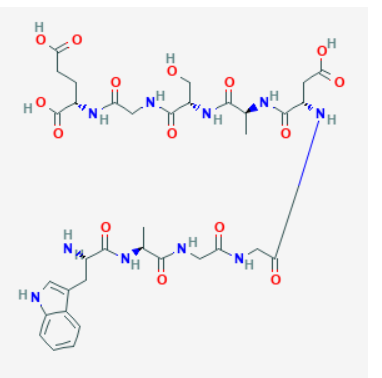DSIP
Delta sleep-inducing peptide (DSIP) is a neuropeptide that plays a role in various endocrine and physiological processes within the central nervous system. It is primarily studied for its potential to reduce oxidative stress, regulate myocardial contractility, and serve as a therapeutic target for major depressive disorder.
Product Usage
This product is intended for research purposes only. It is strictly designated for in vitro testing and laboratory experimentation. All information provided on this website is for educational purposes only. Any introduction into humans or animals is strictly prohibited by law. Only licensed, qualified professionals should handle this product. It is not a drug, food, or cosmetic and must not be misbranded, misused, or mislabeled as such.
What Is DSIP?
Delta sleep-inducing peptide (DSIP) is a naturally occurring short peptide, first isolated in 1977 from rat brains during slow-wave sleep. Initially recognized for its ability to induce sleep in rabbits, DSIP has since been found to influence various physiological and endocrine processes. Research indicates that it can regulate corticotropin levels, inhibit somatostatin secretion, reduce stress, stabilize blood pressure, modify sleep cycles, and affect pain perception. Additionally, DSIP shows potential in future applications for cancer treatment, depression management, and protection against free radical damage.
DSIP Structure
Sequence: Trp-Ala-Gly-Gly-Asp-Ala-Ser-Gly-Glu
Molecular Formula: C35H48N10O15
Molecular Weight: 848.824 g/mol
PubChem CID: 68816
CAS Number: 62568-57-4
Synonyms: Emideltide, DSIP nonapeptide, Deltaran

DSIP Research
The Relationship Between DSIP and Sleep
Despite its name, the link between delta-sleep-inducing peptide (DSIP) and sleep remains unclear. Initial studies in rabbits suggested a connection, prompting extensive research to determine its effects. However, results have been inconsistent. Some studies indicate that DSIP promotes slow-wave sleep while suppressing paradoxical sleep, whereas others show no effect. One study reported an initial period of arousal during the first hour of sleep, followed by sedation in the second hour. Overall, DSIP appears to help normalize sleep cycles and regulate dysfunction, a conclusion supported by other research findings.
Among the most notable studies on DSIP and sleep are those involving chronic insomnia. In these cases, DSIP improved sleep patterns to levels comparable to healthy controls. Additional research suggests that DSIP enhances sleep structure and reduces sleep latency in individuals with persistent sleep disturbances. Polysomnographic studies indicate that DSIP increases sleep efficiency, although the effect is statistically significant yet relatively modest.
Despite conflicting findings, DSIP’s connection to sleep onset cannot be ignored. Research in human subjects has revealed subjective benefits, such as increased sleepiness, prolonged sleep duration (by 59% compared to placebo), and reduced sleep onset time. However, EEG analyses contradict these findings, showing no clear sedative effect. This discrepancy may stem from current testing methodologies, which rely on pharmacologic sedation models rather than natural sleep processes. DSIP may provide valuable insights into sleep regulation, potentially refining how scientists measure and understand human sleep.
DSIP and Chronic Pain
Managing chronic pain presents significant challenges, as conventional treatments like NSAIDs and opioids often lead to adverse effects with prolonged use. Researchers have explored DSIP as an alternative, with promising early results. A small human trial found that DSIP significantly reduced pain perception and improved mood. Additionally, it may help individuals dependent on pain medications by alleviating withdrawal symptoms and minimizing pain rebound following discontinuation.
Animal studies suggest that DSIP exerts analgesic effects through central opioid receptors. However, it remains unclear whether these effects are direct or indirect. Importantly, DSIP does not appear to induce dependency, unlike traditional opioids, despite acting on the same neural pathways.
DSIP and Metabolism
Research in rats indicates that DSIP mitigates stress-induced metabolic disruptions that force mitochondria to shift from oxygen-dependent to oxygen-independent respiration. The latter process is inefficient and leads to toxic byproducts. DSIP’s ability to preserve oxidative phosphorylation, even under hypoxic conditions, suggests potential therapeutic applications in stroke and heart attack treatment. By maintaining mitochondrial function, DSIP may reduce metabolic damage and protect tissues until normal blood flow is restored.
These findings highlight DSIP’s potent antioxidant properties. By supporting mitochondrial function, DSIP helps limit free radical production, making it a potential anti-aging therapy. However, further research is necessary to confirm these benefits.
DSIP, Depression, and Chemical Imbalances
DSIP’s role in regulating mitochondrial activity under hypoxic conditions led scientists to investigate its effects on monoamine oxidase type A (MAO-A) and serotonin levels. Findings suggest that DSIP influences these neurotransmitters, prompting research into its potential role in depression.
Analyses of cerebrospinal fluid from patients with major depressive disorder have shown lower DSIP levels compared to healthy controls. Given the well-documented link between sleep disturbances and depression, it is plausible that DSIP plays a role in mood regulation. Although DSIP has not yet been tested as a direct treatment for depression, its involvement in the hypothalamic-pituitary-adrenal axis suggests it may influence suicidal behavior.
DSIP and Addiction Recovery
Studies investigating DSIP’s effects on withdrawal symptoms during alcohol and opioid detoxification have yielded promising results. In a trial involving 107 patients experiencing withdrawal, DSIP significantly improved symptoms in 97% of alcohol-dependent patients and 87% of opioid-dependent patients. However, opioid withdrawal was more resistant to treatment, requiring extended DSIP administration.
Given that alcohol withdrawal can be life-threatening, any advancements in treatment options hold significant clinical value.
DSIP and Cancer Prevention
While cancer research primarily focuses on treatment, some scientists are exploring preventive approaches. One area of interest is immune system modulation to eliminate precancerous cells before they develop into malignancies. Research in mice suggests that DSIP may be more effective in cancer prevention than any vaccine tested to date. In a study where female mice received DSIP for five consecutive days each month from three months of age until death, tumor incidence decreased 2.6-fold. Additionally, bone marrow analysis showed a 22.6% reduction in chromosomal defects.
DSIP as a Cancer Treatment Adjuvant
One of the lesser-known effects of chemotherapy is its impact on central nervous system function, leading to cognitive impairments, motor deficits, and mood disturbances. Children undergoing chemotherapy are particularly vulnerable to these side effects. A recent study suggests that DSIP may prevent or even reverse these neurological changes. Research in rats indicates that DSIP and its alternative formulation, Deltaran, significantly improve cerebral blood flow under stress conditions, such as ischemia and chemotherapy. In an animal model of cerebral ischemia, survival rates were 100% in DSIP-treated subjects compared to 62% in controls, highlighting its potential neuroprotective benefits.
DSIP’s Physiologic and Muscle-Building Effects
DSIP was first identified in rabbit brains during slow-wave sleep, but its exact origin and synthesis remain unknown. Interestingly, DSIP levels in peripheral tissues match those in the central nervous system, suggesting that its primary function may extend beyond sleep regulation.
Some researchers speculate that DSIP may act as a hypothalamic hormone with widespread regulatory effects. One study found that DSIP inhibits somatostatin, a protein that suppresses muscle growth. By counteracting somatostatin, DSIP may contribute to muscle hypertrophy and hyperplasia. These findings challenge traditional views of DSIP as a sleep-promoting peptide and suggest a broader physiological role.
Further supporting this theory, animal studies indicate that DSIP influences blood pressure, heart rate, thermogenesis, and immune function. Notably, some of these effects occur before any observable sleep-related changes, implying that DSIP may prepare the body for sleep by modulating physiological processes.
DSIP Administration and Availability
DSIP exhibits minimal side effects, low oral bioavailability, and excellent subcutaneous bioavailability in animal models. However, dosage in mice does not scale directly to humans. DSIP available through Harfi is strictly for educational and scientific research purposes and is not intended for human consumption. Only licensed researchers should purchase DSIP for experimental use.
DISCLAIMER: FOR INFORMATIONAL AND EDUCATIONAL PURPOSES ONLY
All articles and product details provided on this website are strictly for informational and educational purposes.
The product information presented here applies solely to in-vitro studies—experiments conducted outside of living organisms, such as in laboratory settings. These products are not classified as medicines or drugs and have not been approved by the FDA for the prevention, treatment, or cure of any medical conditions, ailments, or diseases.
Furthermore, the use of these products in humans or animals is strictly prohibited by law.

